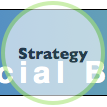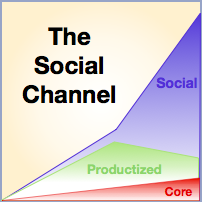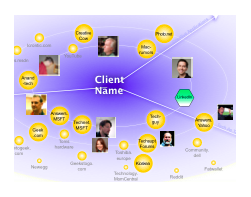 [UPDATED] Several times over the past few years, I have been contacted by major brands to advise them on finding a “social media executive” to help them “figure out social media” and “create a strategy.” In 2012, many firms began building social media teams in earnest, and this trend will continue to grow in the years ahead. Firms are also bringing “social media work” inside after having outsourced it to agencies. All of my client work has involved helping clients to build social business competency and teams, so here I’ll offer some pointers for how to build teams and avoid the pitfalls most companies experience. [UPDATED] Several times over the past few years, I have been contacted by major brands to advise them on finding a “social media executive” to help them “figure out social media” and “create a strategy.” In 2012, many firms began building social media teams in earnest, and this trend will continue to grow in the years ahead. Firms are also bringing “social media work” inside after having outsourced it to agencies. All of my client work has involved helping clients to build social business competency and teams, so here I’ll offer some pointers for how to build teams and avoid the pitfalls most companies experience.
Although each organization’s culture is different, the CEO, CDO, CMO or CAO will be happier with the social business investment if s/he doesn’t invest far ahead of return on investment, which remains low at firms that insist on “business-meaningful” metrics, not the PR- or “brand-building” variety. It’s a chicken-and-egg challenge: how do you know what kind of team to build until you’re achieving real business-meaningful returns on your social business initiatives?
[…]

You can create more opportunity with a career mission, especially when you don’t get distracted by traditional career or job search concerns like whether you have a “consulting” or “employment” relationship. Here I’ll share how you can create far more opportunity by changing your assumptions about work, tapping the Social Channel and aligning yourself with the emerging Knowledge Economy. To illustrate the point, I’ll use myself as an example because I’m a veteran of many types of “work arrangements.”
It’s the good news-bad news story of the almost-decade: legacy “work” and “jobs” have permanently gone by the wayside as the primary means for people to be productive in “modern” economies (bad news). However, people can create a higher quality of life by adopting a more flexible approach to work, and organizations are crying out for flexibility (good news).
[…]
 When CSRA released the Social Network Roadmap in Q2 2008, we were a unique voice speaking at conferences about enterprise adoption. Due to my prior work helping enterprises adopt disruptive technologies like distributed computing, Web applications, service-oriented architecture and Web services, it was easy to see what enterprise adoption would look like, so I designed Social Network Roadmap several years before most of the market was ready to use it. Our client work has enabled us to test, tweak and expand the roadmap since then. As 2012 draws to a close, enterprises have experimented, adoption of social technologies (“social media”) among most stakeholders has set records, and executives wonder how they can coordinate social business across the enterprise. To realize “compounded” enterprise social business benefits it’s important to understand the social business life cycle, so here is a brief treatment. When CSRA released the Social Network Roadmap in Q2 2008, we were a unique voice speaking at conferences about enterprise adoption. Due to my prior work helping enterprises adopt disruptive technologies like distributed computing, Web applications, service-oriented architecture and Web services, it was easy to see what enterprise adoption would look like, so I designed Social Network Roadmap several years before most of the market was ready to use it. Our client work has enabled us to test, tweak and expand the roadmap since then. As 2012 draws to a close, enterprises have experimented, adoption of social technologies (“social media”) among most stakeholders has set records, and executives wonder how they can coordinate social business across the enterprise. To realize “compounded” enterprise social business benefits it’s important to understand the social business life cycle, so here is a brief treatment.
[…]
 Putnam Investments has been a financial services social business pioneer for many years, so here I’ll summarize their pioneering initiatives that show that regulated financial services firms can communicate with clients and prospects in many-to-many social venues without going astray. True, it helps having a CEO that was the first CEO from a mutual funds firm on Twitter. Putnam Investments has been a financial services social business pioneer for many years, so here I’ll summarize their pioneering initiatives that show that regulated financial services firms can communicate with clients and prospects in many-to-many social venues without going astray. True, it helps having a CEO that was the first CEO from a mutual funds firm on Twitter.
The point remains, imagination and inertia are preventing financial services firms from engaging with clients and prospects in digital social venues, not regulators. Here’s how it’s done.
[…]
 The Social Channel of Value explains our era’s drivers of economic transformation and how leaders can use them to strengthen their careers, organizations and communities. Profound shifts in human beings’ means of production restructure society and business because they alter the amount of “value” human work can create as well as the type of “products” that encapsulate people’s work. Individuals and organizations that notice, observe and understand these shifts early on can improve their relevance and competitiveness. Many of those that do not respond quickly enough go down with the ship. The Social Channel of Value explains our era’s drivers of economic transformation and how leaders can use them to strengthen their careers, organizations and communities. Profound shifts in human beings’ means of production restructure society and business because they alter the amount of “value” human work can create as well as the type of “products” that encapsulate people’s work. Individuals and organizations that notice, observe and understand these shifts early on can improve their relevance and competitiveness. Many of those that do not respond quickly enough go down with the ship.
Since the Social Channel is so important, I have published the Social Channel Trilogy, which is summarized here. Find even more information on the Social Channel home page.
[…]
 Social business policy (social media policy) engagements are some of the most interesting, revealing and critical engagements CSRA has done. Of course, organizations’ main motivation for creating social business policies is protecting themselves against possible legal threats caused by employee interactions online; however, a far greater threat is overemphasizing the legal threat and sabotaging employee engagement online. Well researched and crafted social business policy increases trust between the employer and employees—and among employees, leading to more appropriate online interactions, which burnish the firm’s reputation. Here, I’ll outline how you can use the process of creating the policy to manage legal exposure while increasing employees’ trust and productive social business activity. Social business policy (social media policy) engagements are some of the most interesting, revealing and critical engagements CSRA has done. Of course, organizations’ main motivation for creating social business policies is protecting themselves against possible legal threats caused by employee interactions online; however, a far greater threat is overemphasizing the legal threat and sabotaging employee engagement online. Well researched and crafted social business policy increases trust between the employer and employees—and among employees, leading to more appropriate online interactions, which burnish the firm’s reputation. Here, I’ll outline how you can use the process of creating the policy to manage legal exposure while increasing employees’ trust and productive social business activity.
[…]
 The Digital Social Ecosystem Audit shows you where to interact to produce the best outcomes at the minimal cost, so it is critical to social business initiatives. CSRA launched its “Ecosystem Audit” process in 2008, and we’ve conducted them for many businesses and brands, which get to know the digital world around them in an unprecedented way. Think of the ecosystem audit as an xray of the social ecosystem. Try operating without it ;^) – but most firms do! The Digital Social Ecosystem Audit shows you where to interact to produce the best outcomes at the minimal cost, so it is critical to social business initiatives. CSRA launched its “Ecosystem Audit” process in 2008, and we’ve conducted them for many businesses and brands, which get to know the digital world around them in an unprecedented way. Think of the ecosystem audit as an xray of the social ecosystem. Try operating without it ;^) – but most firms do!
Here I’ll offer my insights into client outcomes as well as how we’ve evolved the process and why. You will get some practical pointers about how you can do your own.
[…]
Social Channel Three: Using the Social Channel to Defend Native Markets and Penetrate Foreign Markets
 The global Social Channel will reintroduce “home court advantage” to national brands because those that use social business to compete globally by collaborating with users will have the cultural advantage; “foreign” firms may have better product features for the money, but they will not match home brands’ cultural fluency. Personalized service and attention are culturally specific, and deep cultural fluency directly correlates to intimacy. However, brands can only develop the home court advantage by practicing social business at an advanced level. Most have a long way to go and, meanwhile, they will get hammered when they persist in competing on product features in the Productized Channel of Value. The global Social Channel will reintroduce “home court advantage” to national brands because those that use social business to compete globally by collaborating with users will have the cultural advantage; “foreign” firms may have better product features for the money, but they will not match home brands’ cultural fluency. Personalized service and attention are culturally specific, and deep cultural fluency directly correlates to intimacy. However, brands can only develop the home court advantage by practicing social business at an advanced level. Most have a long way to go and, meanwhile, they will get hammered when they persist in competing on product features in the Productized Channel of Value.
The blade cuts both ways: the home court advantage will make exporting to emerging markets much more difficult in the years ahead. The Social Channel will raise the bar because users in all markets will increasingly expect brands to relate to them and to solicit their input and advice. Brands will have to invest significantly in developing in-market social […]
How Marketers Are Pushing the Wrong Button on Mobile

Mobile advertising is flawed because it interrupts. CMOs’ continued use of such outmoded marketing tactics isn’t pretty, like bursting market bubbles or parties at which one has stayed too long. Screen-hogging banners or tricky apps are unnecessary for those who understand the mobile experience and how to add value; however, they are very effective for alienating clients and customers. As Stan Rapp puts it, “Don’t do things to people (do things with them).” In the interest of doing mobile right, I’ll juxtapose the mobile experience with advertising to show how inappropriate much of it is before suggesting how marketers and brands can add value and avoid destroying trust.
“Everybody hates digital ads.” This is a refrain I’ve heard forever, and I have never heard anyone say that they like them. People don’t even like big screen […]
Social Channel Two: Understanding the Social Channel of Value by Examining Its Precedents
 Meet the Social Channel of Value, the new arena where brands compete for user (customer, client) attention and loyalty. Product features are losing their ability to differentiate because they are copied so easily. Moreover, the Social Channel of Value will transform human decision-making, organizations and institutions because it digitizes sociality, a core human trait, and its power will dwarf the power of the product and the brand. CEOs, CMOs and CPOs have a very rare social business opportunity to harness the Social Channel ahead of competitors and remake their markets. These are strong statements, but bear with me and I think you’ll appreciate why I’ve made them. Meet the Social Channel of Value, the new arena where brands compete for user (customer, client) attention and loyalty. Product features are losing their ability to differentiate because they are copied so easily. Moreover, the Social Channel of Value will transform human decision-making, organizations and institutions because it digitizes sociality, a core human trait, and its power will dwarf the power of the product and the brand. CEOs, CMOs and CPOs have a very rare social business opportunity to harness the Social Channel ahead of competitors and remake their markets. These are strong statements, but bear with me and I think you’ll appreciate why I’ve made them.
The Social Channel is the Knowledge Economy‘s analog to the Industrial Economy’s assembly line, which led to today’s brands and mass-produced products. Where the assembly line made fabrication ten times more efficient, digital social technologies will boost human communication and sociality by an order of magnitude. The “Social Channel of Value” shows how product and service features will […]
|
|
 [UPDATED] Several times over the past few years, I have been contacted by major brands to advise them on finding a “social media executive” to help them “figure out social media” and “create a strategy.” In 2012, many firms began building social media teams in earnest, and this trend will continue to grow in the years ahead. Firms are also bringing “social media work” inside after having outsourced it to agencies. All of my client work has involved helping clients to build social business competency and teams, so here I’ll offer some pointers for how to build teams and avoid the pitfalls most companies experience.
[UPDATED] Several times over the past few years, I have been contacted by major brands to advise them on finding a “social media executive” to help them “figure out social media” and “create a strategy.” In 2012, many firms began building social media teams in earnest, and this trend will continue to grow in the years ahead. Firms are also bringing “social media work” inside after having outsourced it to agencies. All of my client work has involved helping clients to build social business competency and teams, so here I’ll offer some pointers for how to build teams and avoid the pitfalls most companies experience.

 The Social Channel of Value explains our era’s drivers of economic transformation and how leaders can use them to strengthen their careers, organizations and communities. Profound shifts in human beings’ means of production restructure society and business because they alter the amount of “value” human work can create as well as the type of “products” that encapsulate people’s work. Individuals and organizations that notice, observe and understand these shifts early on can improve their relevance and competitiveness. Many of those that do not respond quickly enough go down with the ship.
The Social Channel of Value explains our era’s drivers of economic transformation and how leaders can use them to strengthen their careers, organizations and communities. Profound shifts in human beings’ means of production restructure society and business because they alter the amount of “value” human work can create as well as the type of “products” that encapsulate people’s work. Individuals and organizations that notice, observe and understand these shifts early on can improve their relevance and competitiveness. Many of those that do not respond quickly enough go down with the ship. Social business policy (social media policy) engagements are some of the most interesting, revealing and critical engagements CSRA has done. Of course, organizations’ main motivation for creating social business policies is protecting themselves against possible legal threats caused by employee interactions online; however, a far greater threat is overemphasizing the legal threat and sabotaging employee engagement online. Well researched and crafted social business policy increases trust between the employer and employees—and among employees, leading to more appropriate online interactions, which burnish the firm’s reputation. Here, I’ll outline how you can use the process of creating the policy to manage legal exposure while increasing employees’ trust and productive social business activity.
Social business policy (social media policy) engagements are some of the most interesting, revealing and critical engagements CSRA has done. Of course, organizations’ main motivation for creating social business policies is protecting themselves against possible legal threats caused by employee interactions online; however, a far greater threat is overemphasizing the legal threat and sabotaging employee engagement online. Well researched and crafted social business policy increases trust between the employer and employees—and among employees, leading to more appropriate online interactions, which burnish the firm’s reputation. Here, I’ll outline how you can use the process of creating the policy to manage legal exposure while increasing employees’ trust and productive social business activity.  The Digital Social Ecosystem Audit shows you where to interact to produce the best outcomes at the minimal cost, so it is critical to social business initiatives. CSRA launched its “Ecosystem Audit” process in 2008, and we’ve conducted them for many businesses and brands, which get to know the digital world around them in an unprecedented way. Think of the ecosystem audit as an xray of the social ecosystem. Try operating without it ;^) – but most firms do!
The Digital Social Ecosystem Audit shows you where to interact to produce the best outcomes at the minimal cost, so it is critical to social business initiatives. CSRA launched its “Ecosystem Audit” process in 2008, and we’ve conducted them for many businesses and brands, which get to know the digital world around them in an unprecedented way. Think of the ecosystem audit as an xray of the social ecosystem. Try operating without it ;^) – but most firms do!